- Home
- Courtney Milan
The Governess Affair
The Governess Affair Read online
Uploaded for www.dpgroup.org/forum/
For Amy, Tessa, and Leigh.
I’m never “scared” with you all around.
Chapter One
London, October, 1835.
THE DOOR TO THE UPSTAIRS LIBRARY slammed viciously, rattling in its frame. Heavy steps marched across the room, bearing down on Hugo’s desk. Fists slammed against the wood surface.
“Damn it, Marshall. I need you to fix this.”
Despite that dramatic production, Hugo Marshall did not look up from the books. Instead he waited silently, listening to boots marking a path upon the carpet. He wasn’t a servant; he refused to be treated as one.
After a moment, his patience was rewarded. “Fix it, please,” the Duke of Clermont muttered.
Hugo raised his head. An untutored observer would focus on the Duke of Clermont, apparently in full command, resplendent in a waistcoat so shot with gold thread that it almost hurt the eyes. This observer would dismiss the drab Mr. Marshall, arrayed as he was in clothing spanning the spectrum from brown to browner.
The comparison wouldn’t stop at clothing. The duke was respectably bulky without running to fat; his patrician features were sharp and aristocratic. He had mobile, ice-blue eyes that seemed to take in everything. Compared with Hugo’s own unprepossessing expression and sandy brown hair, the untutored observer would have concluded that the duke was in charge.
The untutored observer, Hugo thought, was an idiot.
Hugo set his pen down. “I wasn’t aware there was anything in need of fixing.” Except the matter of Her Grace. “Anything within my purview, that is.”
Clermont positively bristled with an edgy nervousness. He rubbed his nose in a manner that was decidedly unmannered. “There’s something else. It’s come up just this morning.” He glanced out the window, and his frown grew.
The library in Clermont’s London home was two floors off the ground, and claimed an uninspiring view. There was nothing to see out the window but a Mayfair square. Autumn had turned green leaves to brown and yellow. A small bit of fading grass and a few dingy shrubberies ringed a wrought-iron bench, upon which a woman was seated. Her face was occluded by a wide-brimmed bonnet decorated with a thin pink ribbon.
Clermont clenched his hands. Hugo could almost hear the grinding of his teeth.
But his words were casual. “So, if I refuse to pander to the duchess’s ridiculous demands, you’d still work everything out, wouldn’t you?”
Hugo gave him a stern look. “Don’t even consider it, Your Grace. You know what’s at stake.”
The other man folded his arms in denial. His Grace really didn’t understand the situation; that was the problem. He was a duke, and dukes had no notion of economization. Were it not for Hugo, Clermont’s vast estates would have collapsed years before under the weight of his debt. As it was, the books barely balanced—and they only did that because of the man’s recent marriage.
“But she’s so unamusing,” Clermont protested.
“Yes, and a fine joke it will be to have your unentailed property repossessed. Convince your duchess that she well and truly wishes you back in her life. After that, you may laugh all you wish, Your Grace.”
There had been money up front in the marriage settlement. But that had disappeared quickly, paying off lingering mortgages and troubling debts. The remainder of the duchess’s substantial dowry had been tied up in trust by the girl’s father—the funds to be released on a regular schedule, so long as the duke kept his wife happy.
Alas. The duchess had decamped four months ago.
Clermont pouted. There was no other word for it; his shoulders slumped and he kicked at the edge of the carpet like a petulant child. “And here I thought all my money worries were over. What do I hire you for, if not to—”
“All your money worries were over, Your Grace.” Hugo drummed his fingers on the table. “And how many times must I remind you? You don’t hire me. If you hired me, you’d pay me wages.”
Hugo knew too much about the duke’s prospects to accept anything so futile as a promise of salary. Salaries could be delayed; wagers, on the other hand, sanctified by the betting book at White’s, were inviolable.
“Yes,” the duke groused, “and about that. You said that all I had to do was find an heiress and say whatever it took to make her happy.” He scowled at the carpet underfoot. “I did. Now look where it’s got me—every shrewish bitch in the world thinks it her right to harp at me, over and over. When will it end?”
Hugo raised his head and looked Clermont in the eyes. It didn’t take long—just a few seconds of an intent stare—and the man dropped his chin and looked away, as if he were the employee and Hugo his master.
It was embarrassing. A duke should have known how to take charge. But no; Clermont was so used to having others bow before his title that he’d never learned to command by force of personality.
“There appears to have been a miscommunication.” Hugo steepled his fingers. “I never told you to say whatever it took to make her happy.”
“You did! You said—”
“I told you to do whatever it took to make her happy.”
Sometimes, Clermont was like a little child—as if nobody had ever taught him right from wrong. At this, he wrinkled up his nose. “What’s the difference?”
“What you said was that you’d love her forever. What you actually did was marry her and take up with an opera singer three weeks later. You knew you had to keep that girl happy. What were you thinking?”
“I bought her a bracelet when she complained! How was I supposed to know she wanted fidelity from me?”
Hugo focused on the papers on his desk. Even his own late, unlamented father had managed fidelity: sixteen children worth of it, to be precise. But this was no time to remind the duke of his wedding vows. He sighed.
“Win her back,” he said softly. It was his future at stake, too. After all, he wasn’t an employee, receiving a salary for his hard work. He operated on a form of commission—on wagers, to be exact, in the language of the financially incompetent duke. If he brought the duke through the end of this year in one piece, he’d win five hundred pounds. That wasn’t just money; those five hundred pounds would be the means to begin his own empire.
He’d worked three years on that hope. When he considered, briefly, the possibility that he might lose… He could almost see the shadowy figure of his father standing over him. You bloody useless git. You’ll never be anybody.
He shook his head, sending those darker thoughts scattering. He wasn’t going to be just anybody. He was going to be the wealthiest coal miner’s son in all of England.
But Clermont wasn’t meeting his eyes. Instead, he frowned and looked out the window. “It’s not quite so simple.”
That woman was still sitting on the bench. She’d turned her head to the side, and Hugo caught a glimpse of profile—snub nose, a smudge of pink for her lips.
“You see,” Clermont muttered, “there was this governess.”
Hugo rolled his eyes. Any confession that started thus could not end well.
Clermont gestured. “It happened over the summer, when I was seeing to business at Wolverton Hall.”
Hugo translated this mentally: The duke had been drinking himself silly with his useless friends after his wife had flounced off and his father-in-law had tied off the once-generous purse strings. But no point in insisting on honesty from the man. He’d never get it.
“In any event,” Clermont said, pointing to the bench outside, “that’s her, now. Waiting. Demanding compensation from me.”
“Your pardon?” Hugo shook his head in confusion.
The duke huffed. “Must I spell it out? She wants
things from me.”
Had he thought the duke a child? An infant, more like. Hugo kept his voice calm. “Between seeing to business at Wolverton Hall and a governess waiting outside your home demanding compensation, there are a great many events missing. For what is she demanding compensation? Who brought this matter to your attention?”
“She caught me just now, when I was returning from…well, never mind where I was,” the duke said. “She was on the street, waiting for the carriage to arrive.”
“And what does she want?” Hugo persisted.
Clermont gave an unconvincing laugh. “Nothing! Nothing, really. I, uh, at Wolverton Hall, I saw that she was good with the younger children. So I offered her a position taking care of my son.”
“Your as-yet-unborn child.”
“Yes,” Clermont mumbled. “Exactly. And so she quit her position at Wolverton. And then I had no work to offer her because the duchess had left. Now she’s angry, too.”
The story didn’t sound remotely plausible. Hugo considered, briefly, calling His Grace a liar. But it wouldn’t do any good; long experience had taught him that once the duke made up a story, he’d hold to it doggedly, no matter how many holes one poked in it.
“She says she’ll sit there until she receives compensation,” Clermont said. “I do believe she means it. You see my dilemma. If everything works out well, I’ll be bringing back the duchess in a matter of weeks. This is devilishly awkward timing. The old girl will think…”
“…That you seduced and ruined a servant?” Hugo asked dryly. That was where he would place his money.
But Clermont didn’t even blush. “Right,” he said. “You can see the very idea is absurd. And of course I did no such thing—you know that, Marshall. But matters being what they are, she needs to be gone by the time I return.”
“Did you force her?” Hugo asked.
Clermont did flush at that. “Gad, Marshall. I’m a duke. I have no need to force women.” He frowned. “What do you care anyway? They don’t call you the Wolf of Clermont for your conscience.”
No. They didn’t. But Hugo still had one. He just tried not to remember it.
Hugo looked out the window. “Easy enough. I’ll have the constables take her in for vagrancy or disturbing the peace.”
“Ah…no.” Clermont coughed lightly.
“No?”
“I wouldn’t precisely say it was a good idea to put her into a courtroom. You know how they have those reporters there, writing a few lines for the papers. Someone might ask questions. She might invent stories. And while I could certainly quash any legal inquiry, what if word of this got back to Helen? You know how touchy she is on the subject of other women.”
No, he wasn’t getting anything useful from the man. Hugo sighed. “You talked to her. What kind of compensation does she want?”
“Fifty pounds.”
“Is that all? We can—”
But Clermont shook his head. “She doesn’t just want the money. I can’t give her what she wants. You’ll have to persuade her to go. And keep my name out of the gossip papers, will you?”
Hugo pressed his lips together in annoyance.
“After all,” Clermont said, striding to the door, “it’s my entire future that’s at stake. When I return, I expect that you’ll have sorted out this entire unfortunate affair with the governess.”
It wasn’t as if Hugo had any choice in the matter. His future was at stake, too, every bit as much as Clermont’s. “Consider her gone.”
Clermont simply nodded and exited the room, leaving Hugo to contemplate the bench in the square below.
The governess sat, turning her head to watch people passing on the pavement. She did not look as if she were about to burst into hysterics. Perhaps Clermont hadn’t wronged her all that much, and he could solve this over the course of one conversation. He hoped so, for her sake.
Because if talk didn’t work, he was going to have to make her life hell.
He hated having to do that.
IT WAS HARD FOR Miss Serena Barton to keep from fidgeting at the best of times; today, a chill wind had arisen in the afternoon, sending clouds scudding overhead and robbing the day of sunshine. The breeze sent autumn leaves rattling across the cobblestones. It sliced through her inadequate pelisse, and it was all she could do to refrain from wrapping her arms around herself. Still, she forced herself to sit, her spine straight. She wasn’t going to freeze to death; she was just going to get very, very cold. Nothing that a cup of hot tea wouldn’t fix when she returned to her sister’s rooms that evening.
She glanced sidelong at the small cluster that had gathered on the gangway in front of the Duke of Clermont’s home. In the lull of the late afternoon, a few servants had come by; they huddled in a little knot to gawk at her. No doubt they knew she’d talked to Clermont. She was counting on their gossip. Speculation would embarrass the man more than a simple recounting of the truth, and her only hope was to embarrass him a great deal. Speculation bred gossip; gossip gave rise to censure.
Three maids in ruffled aprons were whispering to one another when a man turned the corner onto the street. He scarcely seemed to notice them, but the group of women took one look at him and scattered to their respective houses, like hens fleeing a hawk overhead.
He didn’t look like an aristocrat. He wore a brown suit, simply made, and a cravat, plainly tied. His linen was not the snowy-white that the wealthy insisted upon; his cuffs looked clean, but—as whites were wont to do upon washing—faded to a less respectable ivory. He stopped on the street just opposite her, and raised his head to meet her eyes.
For three months, Serena had wondered where she had gone wrong—what she could have done to avoid this fate. She’d retraced her steps a thousand times, searching for her error.
She’d been weak three months ago, when the duke had first found her—dropping her eyes for every man simply because he was bigger and stronger, holding her silence merely because it was improper to scream. Serena was done being weak.
She’d met the duke’s gaze this morning, not flinching when she looked in his eyes and issued her threats. After that, she could do anything.
And this man wasn’t a duke.
So she met his gaze. I’m not afraid of you, she thought. And if the clamminess of her palms declared otherwise, there was no need to tell him that.
But he was only a working man, if she read the middling-quality fabric of his jacket aright. Everything about him was middling. He wasn’t particularly tall, nor was he short. He was neither skinny nor fat. The most that she could imagine anyone saying about him was that he was virulently moderate.
He looked safe. An utterly ridiculous thing to think, of course. Still, Serena held his eyes, smiled, and gave the fellow a polite, dismissive nod.
He crossed the street toward her.
He was as unremarkable as the shrubbery that edged the square. He had a nondescript face, so familiar that it might have belonged to anyone. He gave her a friendly, unassuming smile.
She did not respond in kind. She wasn’t nice, she wasn’t easy, and she was done being a target. She gave him a pointed look—a raise of her eyebrow that signified don’t you impinge on my time.
A man as ordinary as this one should have flinched from her expression. But this one came right up to her bench and, without so much as asking her leave, sat next to her.
“Nice day,” he commented.
His voice was like his face: not too high and not too deep. His accent was not the drawl of aristocratic syllables trained to lazy perfection, but a hint of something from the north.
“Is it?” It wasn’t—not when she’d been sitting outside long enough to turn her nose red. Not when an unfamiliar man sat next to her and started a conversation.
She turned to frown at him.
He was watching her with a quizzical little smile. “I believe there is no good way to continue.”
She sighed. “You’ve come for goss
ip, haven’t you?”
“You could say that.” He tensed, and then met her eyes. “It’s Hugo Marshall, by the way.” He tossed the introduction out, and then leaned back, as if waiting for her response.
Was he an important man? She remembered the servants scattering as he’d approached. Maybe he was a solicitor, who might carry tales. Or a butler, who enforced rules. He looked rather young to be a Mayfair butler, but whatever he was, he wasn’t going away.
She would have preferred a woman to start the gossip—she found it easier to talk to women. But perhaps this fellow would do.
“Miss Serena Barton,” she finally offered. “I suppose everyone wants to know why I’m here.”
He shrugged, and gave her another one of those pleasant smiles. “I have no interest in everyone,” he responded smoothly. “But I do wish you’d satisfy my individual curiosity. The accounts I have heard are quite garbled.”
She had no intention of satisfying anything of his. She’d been cut deep by her own silence—cut to the point of shame. Now it was her turn to wield that knife.
The Duke of Clermont had told her to stay quiet. So she would.
“Accounts? What accounts?” she asked.
“I’ve heard you’re Clermont’s former mistress.”
She raised a single eyebrow at that. Silence could cut both ways—for instance, when one failed to repudiate rumors that might cause damage. She wished Clermont much joy of her silence.
He tapped his fingers against the arm of the bench, holding her gaze. “I’ve heard you’re a governess, and that Clermont promised you a position looking after his unborn child. When he reneged, you took to sitting outside here to shame him for not honoring his contracts.”
That was so absurd that she couldn’t stop herself from laughing.
He simply sighed. “No,” he said. “Of course not.”
If gossip was running to breach of contract, she needed a new strategy. But Serena simply smoothed her skirts over her knees. “My,” she said. “Do keep talking. What else?”
He pushed his gloved hands together and looked down. “I’ve heard that Clermont forced himself on you.” This last came out in a low growl.

 Her Every Wish
Her Every Wish Midnight Scandals
Midnight Scandals After the Wedding
After the Wedding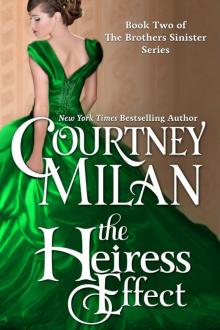 The Heiress Effect
The Heiress Effect Unraveled
Unraveled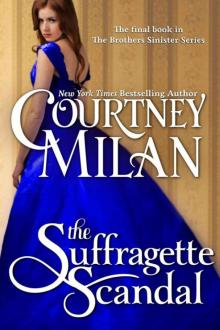 The Suffragette Scandal
The Suffragette Scandal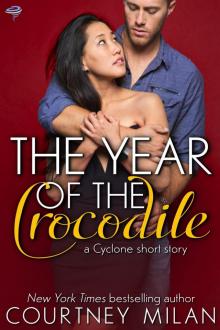 The Year of the Crocodile
The Year of the Crocodile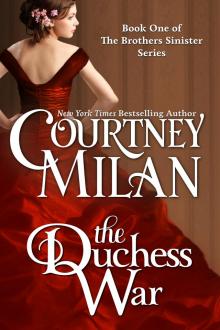 The Duchess War
The Duchess War What Happened at Midnight
What Happened at Midnight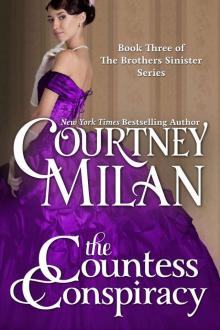 The Countess Conspiracy
The Countess Conspiracy Proof by Seduction
Proof by Seduction Unlocked
Unlocked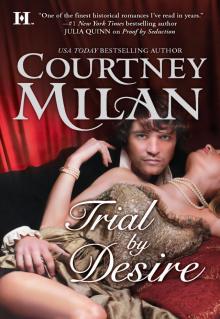 Trial by Desire
Trial by Desire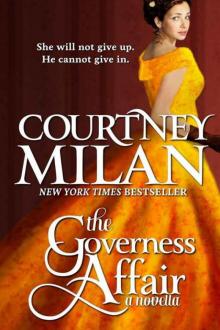 The Governess Affair
The Governess Affair Unveiled
Unveiled The Lady Always Wins
The Lady Always Wins Trade Me
Trade Me Unclaimed
Unclaimed This Wicked Gift
This Wicked Gift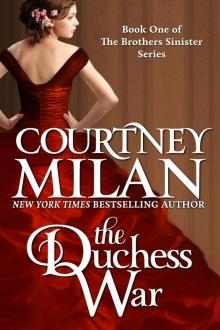 The Duchess War (The Brothers Sinister)
The Duchess War (The Brothers Sinister) Hamilton's Battalion: A Trio of Romances
Hamilton's Battalion: A Trio of Romances The Turner Series
The Turner Series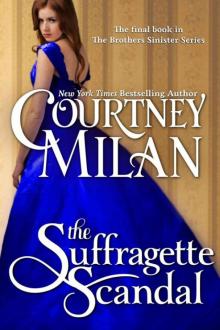 The Suffragette Scandal (The Brothers Sinister)
The Suffragette Scandal (The Brothers Sinister)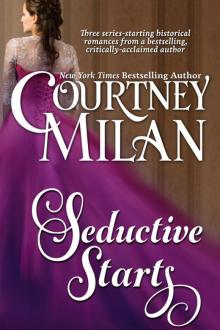 Seductive Starts
Seductive Starts The Pursuit Of…
The Pursuit Of… Hamilton's Battalion
Hamilton's Battalion The Carhart Series
The Carhart Series Seven Wicked Nights
Seven Wicked Nights This Wicked Gift (A Carhart Series Novella)
This Wicked Gift (A Carhart Series Novella)